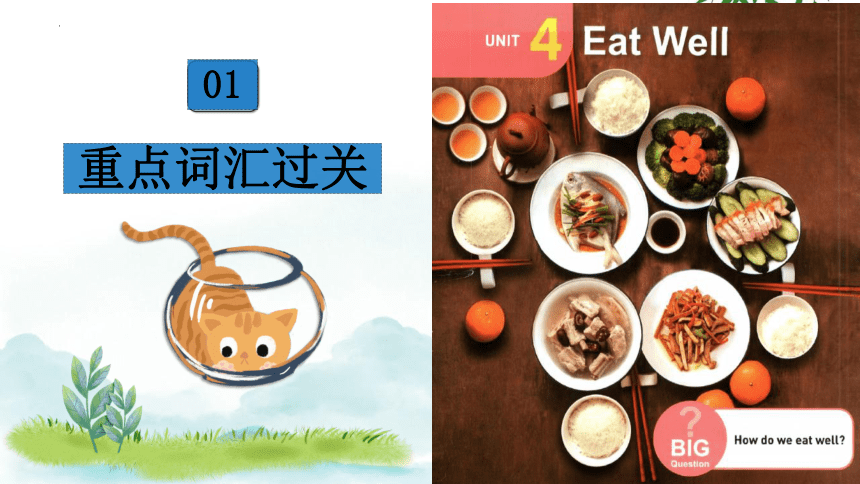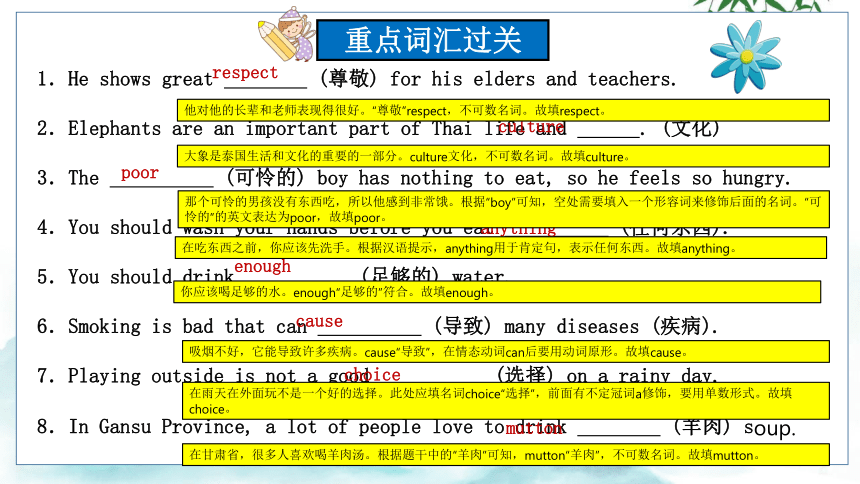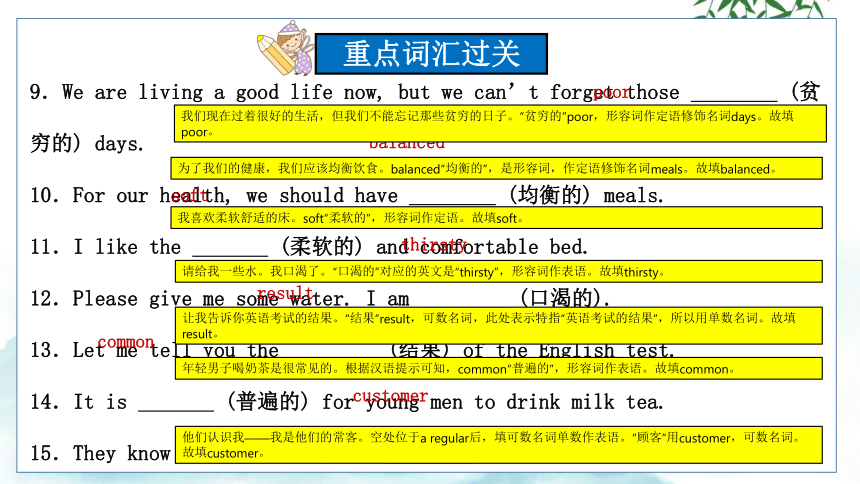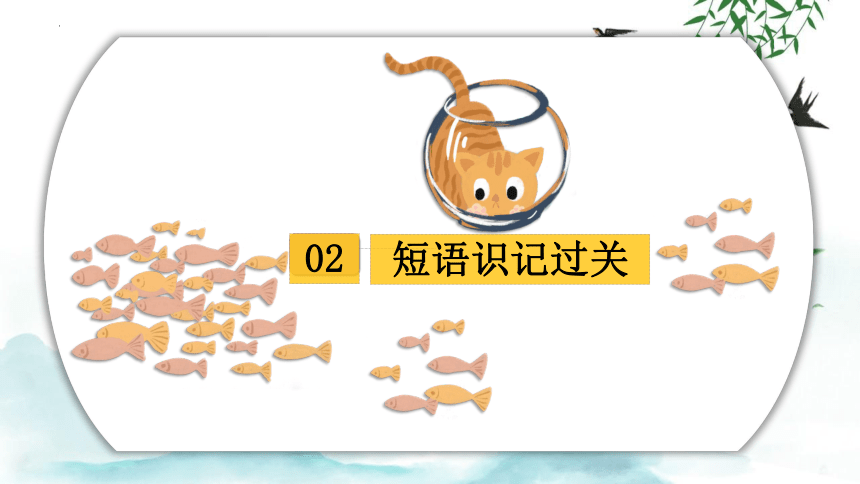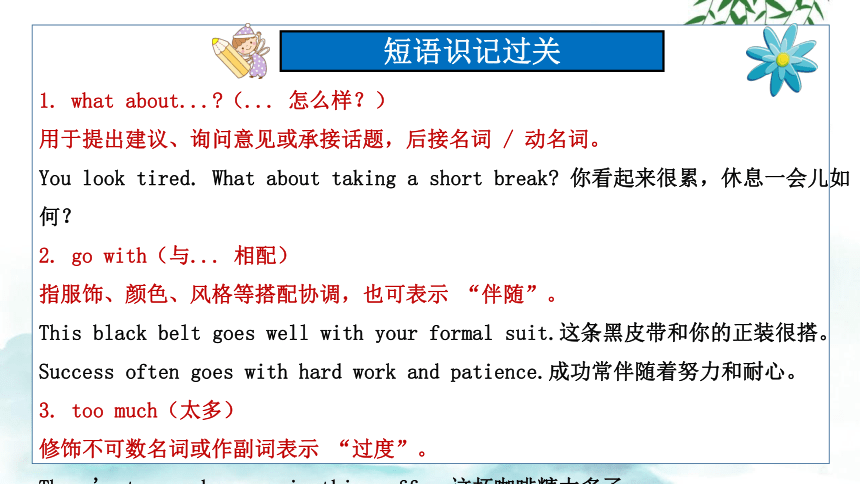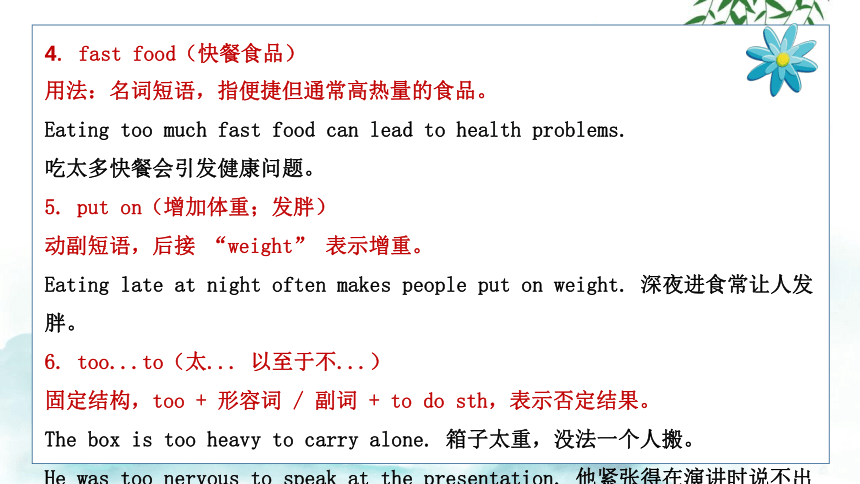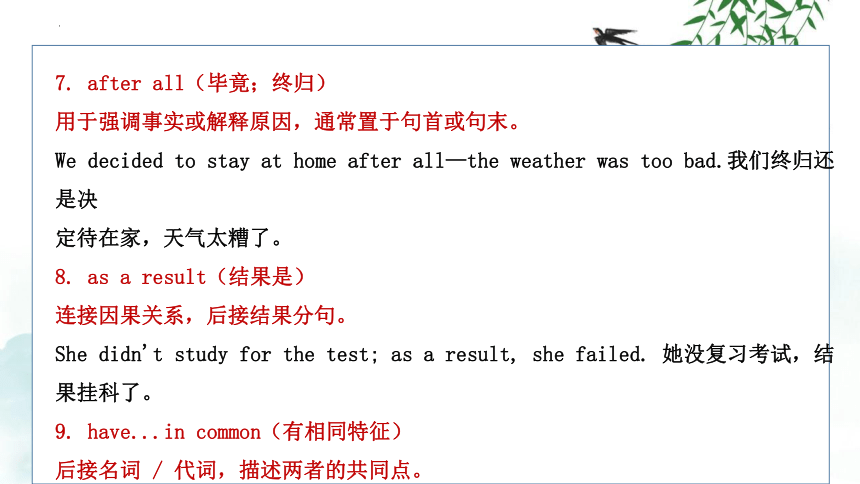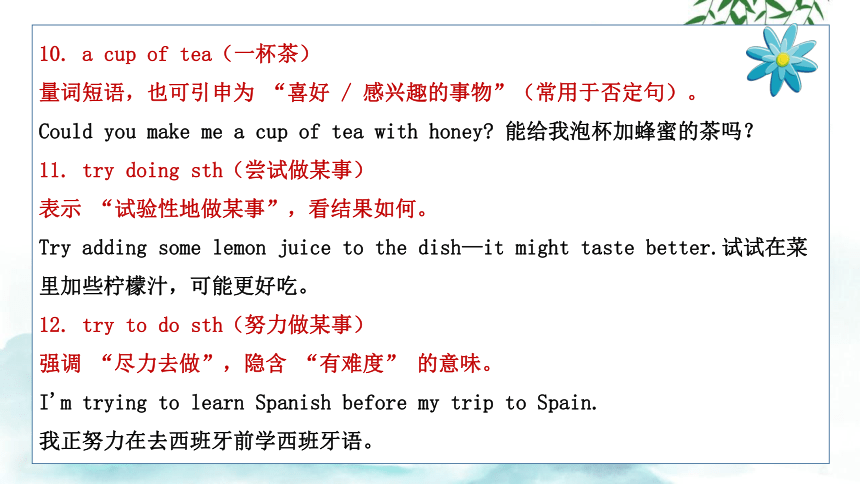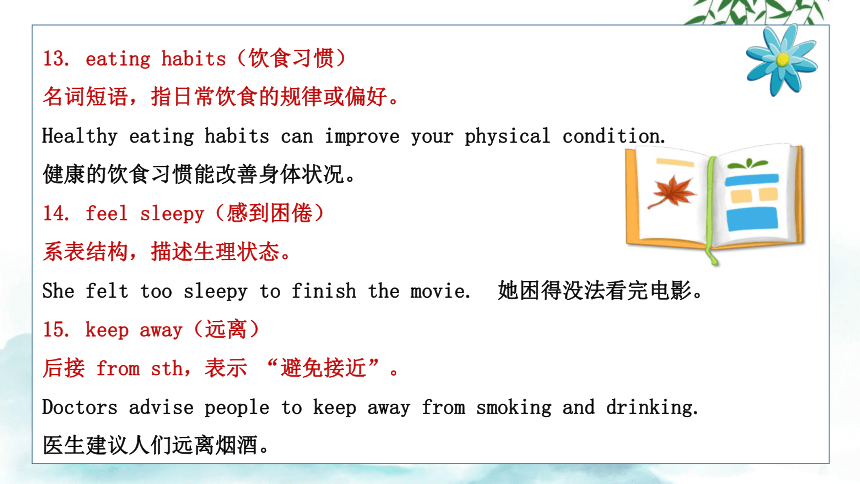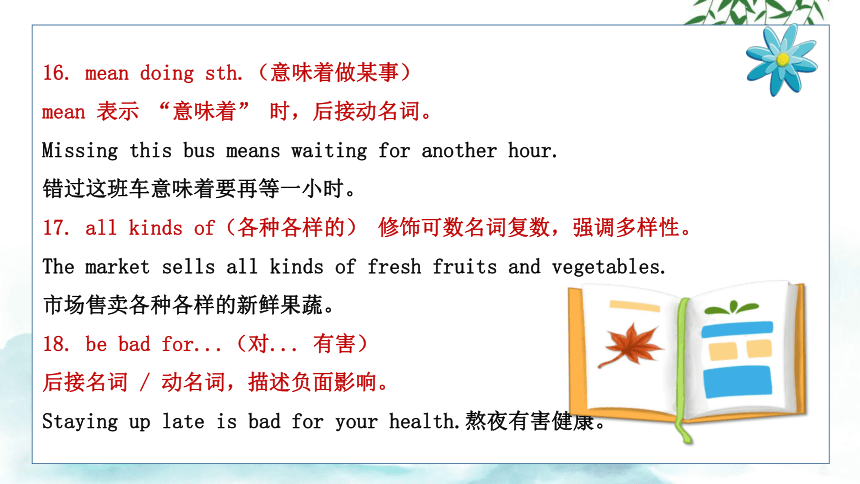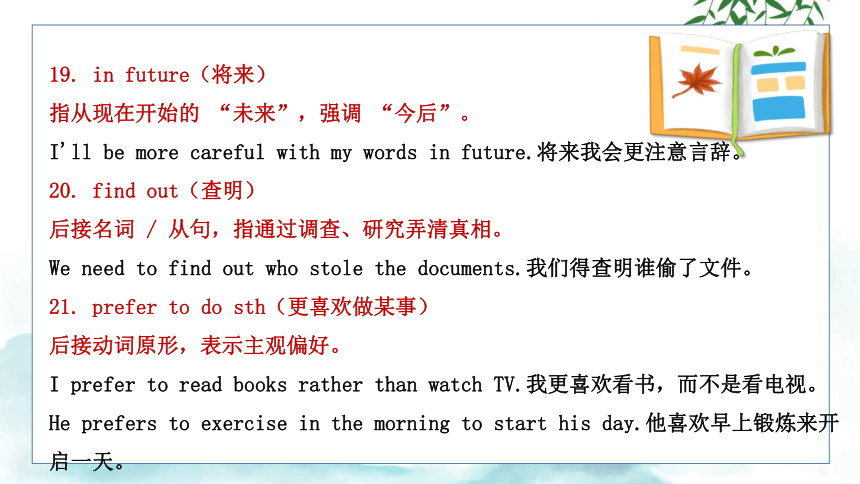 資源簡介
資源簡介
(共34張PPT)
新人教版七年級英語
單元基礎知識復習
Unit 4 Eat Well
01
重點詞匯過關
重點詞匯過關
1.He shows great (尊敬) for his elders and teachers.
2.Elephants are an important part of Thai life and . (文化)
3.The (可憐的) boy has nothing to eat, so he feels so hungry.
4.You should wash your hands before you eat (任何東西).
5.You should drink (足夠的) water.
6.Smoking is bad that can (導致) many diseases (疾病).
7.Playing outside is not a good (選擇) on a rainy day.
8.In Gansu Province, a lot of people love to drink (羊肉) soup.
respect
culture
poor
anything
enough
cause
choice
mutton
他對他的長輩和老師表現得很好。“尊敬”respect,不可數名詞。故填respect。
大象是泰國生活和文化的重要的一部分。culture文化,不可數名詞。故填culture。
那個可憐的男孩沒有東西吃,所以他感到非常餓。根據“boy”可知,空處需要填入一個形容詞來修飾后面的名詞。“可憐的”的英文表達為poor,故填poor。
在吃東西之前,你應該先洗手。根據漢語提示,anything用于肯定句,表示任何東西。故填anything。
你應該喝足夠的水。enough“足夠的”符合。故填enough。
吸煙不好,它能導致許多疾病。cause“導致”,在情態動詞can后要用動詞原形。故填cause。
在雨天在外面玩不是一個好的選擇。此處應填名詞choice“選擇”,前面有不定冠詞a修飾,要用單數形式。故填choice。
在甘肅省,很多人喜歡喝羊肉湯。根據題干中的“羊肉”可知,mutton“羊肉”,不可數名詞。故填mutton。
9.We are living a good life now, but we can’t forget those (貧窮的) days.
10.For our health, we should have (均衡的) meals.
11.I like the (柔軟的) and comfortable bed.
12.Please give me some water. I am (口渴的).
13.Let me tell you the (結果) of the English test.
14.It is (普遍的) for young men to drink milk tea.
15.They know me—I’m a regular (顧客).
poor
balanced
soft
thirsty
result
common
customer
我們現在過著很好的生活,但我們不能忘記那些貧窮的日子。“貧窮的”poor,形容詞作定語修飾名詞days。故填poor。
為了我們的健康,我們應該均衡飲食。balanced“均衡的”,是形容詞,作定語修飾名詞meals。故填balanced。
我喜歡柔軟舒適的床。soft“柔軟的”,形容詞作定語。故填soft。
請給我一些水。我口渴了。“口渴的”對應的英文是“thirsty”,形容詞作表語。故填thirsty。
讓我告訴你英語考試的結果。“結果”result,可數名詞,此處表示特指“英語考試的結果”,所以用單數名詞。故填result。
年輕男子喝奶茶是很常見的。根據漢語提示可知,common“普遍的”,形容詞作表語。故填common。
他們認識我——我是他們的常客。空處位于a regular后,填可數名詞單數作表語。“顧客”用customer,可數名詞。故填customer。
重點詞匯過關
02
短語識記過關
短語識記過關
1. what about... (... 怎么樣?)
用于提出建議、詢問意見或承接話題,后接名詞 / 動名詞。
You look tired. What about taking a short break 你看起來很累,休息一會兒如何?
2. go with(與... 相配)
指服飾、顏色、風格等搭配協調,也可表示 “伴隨”。
This black belt goes well with your formal suit.這條黑皮帶和你的正裝很搭。
Success often goes with hard work and patience.成功常伴隨著努力和耐心。
3. too much(太多)
修飾不可數名詞或作副詞表示 “過度”。
There's too much sugar in this coffee.這杯咖啡糖太多了。
4. fast food(快餐食品)
用法:名詞短語,指便捷但通常高熱量的食品。
Eating too much fast food can lead to health problems.
吃太多快餐會引發健康問題。
5. put on(增加體重;發胖)
動副短語,后接 “weight” 表示增重。
Eating late at night often makes people put on weight. 深夜進食常讓人發胖。
6. too...to(太... 以至于不...)
固定結構,too + 形容詞 / 副詞 + to do sth,表示否定結果。
The box is too heavy to carry alone. 箱子太重,沒法一個人搬。
He was too nervous to speak at the presentation. 他緊張得在演講時說不出話。
7. after all(畢竟;終歸)
用于強調事實或解釋原因,通常置于句首或句末。
We decided to stay at home after all—the weather was too bad.我們終歸還是決
定待在家,天氣太糟了。
8. as a result(結果是)
連接因果關系,后接結果分句。
She didn't study for the test; as a result, she failed. 她沒復習考試,結果掛科了。
9. have...in common(有相同特征)
后接名詞 / 代詞,描述兩者的共同點。
What do these two paintings have in common 這兩幅畫有什么共同之處?
10. a cup of tea(一杯茶)
量詞短語,也可引申為 “喜好 / 感興趣的事物”(常用于否定句)。
Could you make me a cup of tea with honey 能給我泡杯加蜂蜜的茶嗎?
11. try doing sth(嘗試做某事)
表示 “試驗性地做某事”,看結果如何。
Try adding some lemon juice to the dish—it might taste better.試試在菜里加些檸檬汁,可能更好吃。
12. try to do sth(努力做某事)
強調 “盡力去做”,隱含 “有難度” 的意味。
I'm trying to learn Spanish before my trip to Spain.
我正努力在去西班牙前學西班牙語。
13. eating habits(飲食習慣)
名詞短語,指日常飲食的規律或偏好。
Healthy eating habits can improve your physical condition.
健康的飲食習慣能改善身體狀況。
14. feel sleepy(感到困倦)
系表結構,描述生理狀態。
She felt too sleepy to finish the movie. 她困得沒法看完電影。
15. keep away(遠離)
后接 from sth,表示 “避免接近”。
Doctors advise people to keep away from smoking and drinking.
醫生建議人們遠離煙酒。
16. mean doing sth.(意味著做某事)
mean 表示 “意味著” 時,后接動名詞。
Missing this bus means waiting for another hour.
錯過這班車意味著要再等一小時。
17. all kinds of(各種各樣的) 修飾可數名詞復數,強調多樣性。
The market sells all kinds of fresh fruits and vegetables.
市場售賣各種各樣的新鮮果蔬。
18. be bad for...(對... 有害)
后接名詞 / 動名詞,描述負面影響。
Staying up late is bad for your health.熬夜有害健康。
19. in future(將來)
指從現在開始的 “未來”,強調 “今后”。
I'll be more careful with my words in future.將來我會更注意言辭。
20. find out(查明)
后接名詞 / 從句,指通過調查、研究弄清真相。
We need to find out who stole the documents.我們得查明誰偷了文件。
21. prefer to do sth(更喜歡做某事)
后接動詞原形,表示主觀偏好。
I prefer to read books rather than watch TV.我更喜歡看書,而不是看電視。
He prefers to exercise in the morning to start his day.他喜歡早上鍛煉來開啟一天。
03
詞匯變形過關
寫出下列名詞的復數形式。
1.bus
2.photo
3.tooth
4.Chinese
5.candy
6.day
7.wife
8.hero
9.child
10.woman
詞匯變形過關
buses
children
photos
women
teeth
Chinese
candies
days
wives
heroes
1.bus“公共汽車”,可數名詞,以“s”結尾,變復數加es。故填buses。
2.photo“相片”,可數名詞,變復數加s。故填photos。
3.tooth“牙齒”,可數名詞,變復數時把“oo”變為ee。故填teeth。
4.Chinese“中國人”,可數名詞,單復數同形。故填Chinese。
5.candy“糖果”,可數名詞,以輔音字母加“y”結尾,變復數時,把“y”變i,加es。故填candies。
6.day“天”,可數名詞,變復數加s。故填days。
7.wife“妻子”,可數名詞,以“fe”結尾,變復數時把“fe”變v,加es。故填wives。
8.hero“英雄”,可數名詞,變復數加“es”。故填heroes。
9.child“孩子”,可數名詞,變復數為children。故填children。
10.woman“女人”,可數名詞,變復數為women。故填women。
11.friend (形容詞) _____________
12. danger (形容詞) _____________
13.swim (現在分詞) _____________
14.sleep (現在分詞) _____________
15.they (賓格) _____________
16.mouse (復數) _____________
17.we (形容詞性物主代詞) _____________
18.relax (形容詞) _____________
19.interest (形容詞) _____________
20.help (形容詞) _____________
dangerous
swimming
sleeping
them
mice
our
helpful
relaxing/relaxed
Interesting/interested
friendly
04
詞匯辨析過關
anything
everything
something
“所有事物;一切”, Everything in the room is tidy.房間里的一切都很整潔。
nothing
“任何事物,任何東西”,通常用于否定句和疑問句中, Do you have anything to add 你有什么要補充的嗎?
“沒有什么”,本身是否定詞,相當于not..anything. Nothing is impossible. 沒有什么是不可能的。
“某事;某物”,通常用于肯定句,也可用于征求對方意見的疑問句中, I need something to fix the bike.我需要某樣修自行車的工具。
詞匯辨析過關
put off
put up
put away
張貼(平面固定):對象多為海報、告示、照片等。
The school put up a notice about the exam.
學校張貼了考試通知。
put out
后接名詞或動名詞(doing),表示 “將某事延后到未來某時”。We have to put off the picnic until next week.
我們得把野餐推遲到下周。
撲滅(消除燃燒狀態):對象為火、煙、蠟燭等燃燒物。
The cat knocked over the lamp and put out the flame.
貓碰倒了燈,熄滅了火焰。
把物品放回固定位置(如衣柜、抽屜、箱子)。Please put away the toys after playing. 玩完后請把玩具收起來。
詞匯辨析過關
詞匯辨析
find out
find
側重通過調查、研究、詢問等方式 “弄清楚未知信息”,對象多為真相、原因、答案等。We need to find out why the machine stopped working.我們得查明機器為何停止運轉。
后接具體物品、人或抽象事物(如答案、真相),強調 “尋找后的結果”。After hours of searching, she finally found her earrings. 找了幾小時后,她終于找到了耳環。
look for
強調 “尋找” 的過程,不涉及結果,可用于進行時態(be looking for)。What are you looking for in the drawer
你在抽屜里找什么呢?
詞匯辨析
sleepy
sleep
形容詞,可作表語(be sleepy)或定語(a sleepy person),強調 “困倦但未睡著”。I’m too sleepy to finish the report. 我太困了,寫不完報告。
后接時間狀語(如 for + 時長)或地點(如 in bed),表示 “入睡” 的動作。She sleeps late on weekends. 她周末睡得很晚。
asleep
形容詞,只能作表語(be/fall asleep)或補語,不能作定語,強調 “已入睡的狀態”。He was sound asleep and didn’t hear the phone.他睡得很熟,沒聽見電話響。
1.—Did you do ______ in the park last Sunday —No, I did ______.
A.interesting something; anything B.something interesting; everything
C.anything interesting; nothing D.interesting anything; something
2.—Do you have________ else to say for your mistakes —________but sorry.
A.anything;Something B.something;Anything
C.something;Everything D.anything;Nothing
3.—It's time to clean your bedroom, Tommy!
—See the tidy room, Mum!____ is where it should be.
A.Something B.Anything C.Everything D.Nothing
4.________will live without sun
A.Something B.Anything C.Nothing D.Everything
C
D
C
C
詞匯辨析過關
5.—Excuse me, sir. We can’t smoke here.
—Sorry, I ________ see the sign. I’ll ________ my cigarette (香煙) at once.
A.don’t; put away B.didn’t; put out C.can’t; put up D.won’t; put off
6.Time to go to bed. ________ your toys, Bill.
A.Put away B.Put up C.Put out D.Put off
7.—Jason, would you please ________ this notice
—No problem. I’ll do it right away.
A.put on B.put off C.put up D.put out
8.It is difficult to ______ the rapidly growing forest fire in Southern California, according to the fire department(部門).
A.put out B.put up C.put off D.put away
B
C
A
A
9.Mum, could you help me ________ my toy car I can’t ________ it anywhere!
A.look for; find B.find; look for
C.look; find out D.look for; find out
10.—What are you doing —I’m ________ my basketball, but I can’t ________ it.
A.looking for; find B.finding; find out
C.looking; find out D.finding out; look for
11.In order to _________the truth, the police are _________the murderer.
A.find; looking for B.look for; finding
C.find out; finding D.find out; looking for
12.--- Can you __________ what time the meeting starts --- Sure!
A.find B.find out C.look for
B
A
A
D
13.—Trudy stayed up late for today’s math exam and she only _____for five hours.
—Poor girl! She felt very ________ and couldn’t help falling ________ in the exam and got a very low mark.
A.sleepy; slept; asleep B.slept; asleep; sleep
C.slept; sleepy; asleep D.asleep; sleepy; sleeping
14.The boy felt ________ so he fell ________ quickly. Don't wake him up.
A.sleepy; sleeping B.asleep; sleepy
C.sleepy; asleep D.sleeping; asleep
15.I felt ________ and soon I fell ________ in the living room.
A.sleepy; asleep B.asleep; sleep C.sleepy; sleep D.asleep; sleepy
A
C
C
05
知識點清單
課本句子梳理 句式要點
1. Ask others for their food preferences and offer choices.詢問他人的食物偏好,并提供選擇。 offer v.提供 offer sb. sth.=offer sth. to sb. 給某人提供某物 近義詞:provide 提供
choice n.選擇 choose--chose v.選擇
make a choice 做選擇 have no choice but to do sth.除了做某事別無選擇
choose (sb.) to do sth.選擇(某人)做某事 choose sb. as...選擇某人作為...
We all choose Tom as our monitor because he is very responsible.
2. We often have it in American, but it may taste different.我們經常在美國吃它,但這里的味道可能不同。 taste v.品嘗,嘗起來 在此處作連系動詞,后面常跟形容詞作表語。
tasty adj.美味的
I hope the dish is tasty.
拓展:taste還可做名詞,意為“味道;滋味”
感官系動詞有:
smell 聞起來 sound聽起來 taste 嘗起來 look 看起來 feel 摸/感覺
3. Do you have anything with tofu 你有豆腐嗎? anything 是由 any+thing 構成的復合不定代詞。意為“任何東西,任何事物”,常用于否定句、疑問句中,作主語時,謂語動詞用第三人稱單數形式。
課本句子梳理 句式要點
4. I try to eat healthy food every day.我每天都盡量吃健康的食物。 healthy adj.健康的 keep healthy 保持健康 =keep/stay fit
拓展:health n.健康 unhealthy adj.不健康的 be in good health身體狀況良好,身體健康
We should eat less junk food because it is bad for our health.
5. Instead, I have a pear or banana, or some strawberries.相反,我吃一個梨或香蕉,或者一些草莓。 instead 副詞,意為“反而,代替”, 常用于句首或句末,位于句首時其后常用逗號,肯定instead所在句的內容。
It’s too hot to walk. Instead, we’ll go shopping.
If you have no cream, use milk instead.
拓展: instead of 介詞短語,意為“代替,而不是”, 后接名詞、
代詞或動詞-ing等作賓語,一般置于句首或句中,否定of后的內容。
They can walk instead of taking a car.
課本句子梳理 句式要點
6. But my mom says that it’s not good to drink too much of it. 但是我媽媽說喝太多不好。 該句中含一個賓語從句,it’s not good to drink of too much of it作主句中say的賓語。
that在句中起連接作用,無實際含義。
It’s not good to drink too much of it. 該句中,it 是形式主語,真正的主語是to drink too much of it.
常考句型:It is adj.(for sb )to do sth.(對某人來說)做某事...
It is useful for us to learn math well in our life.
7. Improve your eating habits.改善你的飲食習慣。 improve vt.改進;改善 improve our environment改善我們的環境
vi. 改進;提高 improvement n.改進;改善;提高 self-improvement 自我改進
habit n.習慣 eating/reading habits 飲食/閱讀習慣
form/have a habit of doing sth.養成/有做某事的習慣
Students should form a good habit of reviewing notes after class.
8. That makes us put on weight. 那使得我們體重增加了。 put on 增加(體重);穿上;表演...
拓展:lose weight 減肥 put on weight 增肥 the weight of... ...的重量 by weight 輪重量,以斤兩計 under weight 重量不足
課本句子梳理 句式要點
9. Eating fast food like pizza and hamburgers too often may cause heart problems later.經常吃披薩和漢堡等快餐以后可能導致心臟問題。 cause v.造成;引起 cause sb to do sth導致某人做某事
I don’t know what caused the fire.
The accident caused me to change my mind.
cause n.原因;起因 What was the cause of the accident
10. They are too busy to eat anything. 他們太忙了不能吃東西。 too..to...“太...而不能”,句子本身是否定含義,too后接形容詞或副詞, to后接動詞原形。
too+adj./adv.+to do sth 太...而不能做某事
He’s too busy to write to me.
拓展:too..to...結構可與so...that...(如此...以至于)或not...enough to do sth.(不夠...做某事)互換
He is too young to go to school.
= He is so young that he can’t go to school.
=He isn’t old enough to go to school.
課本句子梳理 句式要點
11. It’s easy to feel sleepy and find it hard to focus on our work or studies if we don’t have breakfast. 如果我們不吃早餐的話,我們會很容易感到困倦,并且很難集中精力工作或學習。 find it +adj.+to do sth. “發現做某事...”
該結構中的it為形式賓語,后面的動詞不定式短語是真正的賓語, 形容詞作賓語補足語。
I find it easy to use a computer.
拓展:與find有相同用法的動詞還有make, think等
make it adj. (for sb.) to do sth.使(某人)做某事是...的
The spaceship makes it possible to travel to the moon.
think it adj.(for sb.) to do sth.認為(某人)做某事是...的
All of us think it important to study hard.
12. When you want a snack, why don’t you have some fruit instead 當你想吃零食的時候,為什么不吃一些水果代替呢? Why don’t you do sth. 意為“你為什么不做某事?”,常用來向對方提出建議,相當于Why not do sth. 或How/What about doing sth.
肯定回答可用:Good idea./ OK!/ Certainly. / Of course./ All right./ With pleasure.等。
否定回答可用:No, thanks./ I’m afraid not./ No, I don’t think so./ Sorry, I can’t.等。
重點句型過關
1.Jenny’s riding a bike in the Central Park. (對劃線部分提問)
__________________________ Jenny riding a bike
2.I go to the library to do some reading two or three times a week. (對劃線部分提問)
__________________________ do you go to the library to do some reading
3.he, something, is, at, working on, important, the, moment. (連詞成句)
__________________________ __________________________ ______.
4.every, is, she, of, energy, full, always, day (連詞成句)
__________________________ __________________________ ______.
5.The white cat is Lucy and Lily’s. (改為同義句)
The white cat __________________________ Lucy and Lily.
He is working on something important at the moment
She is always full of energy every day
Where is
How often
belongs to
6.They are busy with their homework now. (改為同義句)
They are busy __________________________ their homework now.
7.I’d like some watermelon. (改為一般疑問句)
__________________________ you __________________________ watermelon
8.I would like a cup of tea. (用coffee改為選擇疑問句)
____________ you like a cup of tea _______________ coffee
9.Tom telephoned his parents yesterday. (對劃線部分提問)
__________________________ his parents
10.I’m going to go shopping with my mother tomorrow. (對畫線部分提問)
__________________________ tomorrow?
like some
Would
doing
Would
What are you going to do
or
When did Tom telephone
11.volunteered, the elderly, students, to hand out, to, food (連詞成句)
__________________________ __________________________ _______ ___.
12.of, book, the, full, was, magic(.)
__________________________ __________________________ _______ ___.
13.The baseball glove is Lucy’s. (同義句)
The baseball glove __________________________ _________ Lucy.
14.My new friend Lisa comes from Australia.(改為同義句)
My new friend Lisa __________________________ _________ Australia.
15.You can’t jump the queue in the dining hall.(變成祈使句)
__________________________ _________ the queue in the dining hall.
16.You can’t touch anything in the museum.(改為祈使句)
_______________________________________________ _________ in the museum.
belongs to
Students volunteered to hand out food to the elderly
The book was full of magic
Don’t jump
is from
Don’t touch anything
THE END
展開更多......
收起↑
 資源預覽
資源預覽

